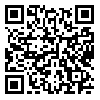Volume 25, Issue 3 (Jun 2017)
JSSU 2017, 25(3): 171-182 |
Back to browse issues page
Abstract: (4946 Views)
Introduction: Curcumin is a bright yellow chemical produced by some plants like Turmeric. The
anti-inflammatory effects of Curcumin were recorded in some studies. This study was done to investigate the effects of the Curcumin on the physiological functions of rat blood monocytes.
Methods: This study was an experimental one. The study population consisted of 20 rats randomly categorized into the treatment and control groups. Curcumin was orally administered to treatment group in daily doses of 200 mg/kg from the beginning of the study and continued for 4 weeks. The control rats received PBS at the same volume. At the ends, the blood samples were taken from the rats and the monocytes were isolated under a ficoll-hypaque gradient. Isolated monocytes were challenged with opsonized yeast and the functions were evaluated.
Results: The results showed that the monocytes isolated from the control and treatment groups have not shown any significant differences in phagocytosis after challenge with opsonized yeast (p=0.1). Nevertheless, the respiratory burst (P=0.009) and nitric oxide production (P=0.03) were decreased in curcumin treated rat compared to the control rats. Albeit, the biological activities of monocytes in the treatment group was increased compared to the monocytes isolated from the control group (P=0.0001).
Conclusions: Collectively, it seems that curcumin is a natural source to intervene the monocytes functions especially in autoimmune diseases so that monocytes hyperactivity causes immunopathological conditions.
anti-inflammatory effects of Curcumin were recorded in some studies. This study was done to investigate the effects of the Curcumin on the physiological functions of rat blood monocytes.
Methods: This study was an experimental one. The study population consisted of 20 rats randomly categorized into the treatment and control groups. Curcumin was orally administered to treatment group in daily doses of 200 mg/kg from the beginning of the study and continued for 4 weeks. The control rats received PBS at the same volume. At the ends, the blood samples were taken from the rats and the monocytes were isolated under a ficoll-hypaque gradient. Isolated monocytes were challenged with opsonized yeast and the functions were evaluated.
Results: The results showed that the monocytes isolated from the control and treatment groups have not shown any significant differences in phagocytosis after challenge with opsonized yeast (p=0.1). Nevertheless, the respiratory burst (P=0.009) and nitric oxide production (P=0.03) were decreased in curcumin treated rat compared to the control rats. Albeit, the biological activities of monocytes in the treatment group was increased compared to the monocytes isolated from the control group (P=0.0001).
Conclusions: Collectively, it seems that curcumin is a natural source to intervene the monocytes functions especially in autoimmune diseases so that monocytes hyperactivity causes immunopathological conditions.
Type of Study: Original article |
Subject:
Immunology
Received: 2016/07/26 | Accepted: 2017/01/7 | Published: 2017/08/7
Received: 2016/07/26 | Accepted: 2017/01/7 | Published: 2017/08/7
| Rights and permissions | |
 |
This work is licensed under a Creative Commons Attribution-NonCommercial 4.0 International License. |


